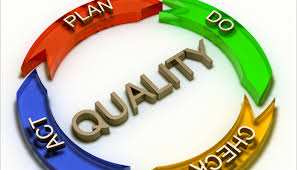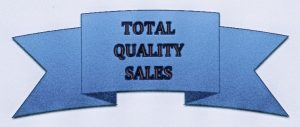Total Quality Selling — 8 Keys To A Quality Selling Culture


Experience is certainly our most prolific teacher but formal learning is invaluable. There must be a reason that education is on every job application and, “Where did you go to school?” is still an office banter staple. Different branches of the learning tree can sometimes be harvested together and become a completely new and elevated lesson.
While I was in corporate my most influential professional training was studying Quality at the Juran Institute. Combining that with the lessons of Total Quality Management gave me a new perspective on manufacturing [and led me to 3 different Time Inc. Quality Awards for Excellence] but perhaps more significantly was the idea that a process could, or could not, be “quality” regardless of whether the output was a widget, a document or a sale.
When I specialized in Sales Training I took in the voluminous education that came with being a Sandler Sales Training franchisee. In my own training business that followed I built on those principles but added my own experiences such as in formal theater schooling and teaching. Presenting, negotiating, selling, are all, to one extent or another, roles to play. The combination of my educations created a marketing difference for me and a Sales or Skills Training difference for my clients.
Recently I was reflecting back on my days wearing a “Quality” hat in light of some client challenges measuring sales performance. Traditionally a clear results or bottom line evaluation, sold/not sold, bottom line; I’ve spent a lot of time in developing salespeople and teams on the notion of KPI’s. Key Performance Indicators that center on the belief that following the correct behaviors will lead to the desired outcome. Critical to that, like a quality program, is measurement. In fact critical to all successful sellers are the three keystones common to all the best quality programs: Planning, Control, Improvement.
Some parallels are obvious, in quality planning we develop a seller’s prospecting plan, the control is in the KPI’s or other behaviors that one is accountable for. Improvement is sought by replicating more success actions and limiting or avoiding weaknesses. Stay away from this kind of prospecting, or go after this profile client for example. Only in experience would there be an application to improve how we sell. “Hmmm, that worked, I’ll try that again.” Instincts more than process get developed but it’s randomness averts the more precise notion of measuring, seeking enhancements, testing, implementing and re-measuring.
We don’t like to call any less than optimal selling elements defects, but really, that’s what they are. Not asking good questions, getting sucked into the buyer’s game or process, allowing ourselves to be penned in with the RFP vendor slog. What if we looked at the selling process with an eye to Total Quality Management elements? Is t possible for an organization to create a Total Quality Selling culture? Here’s how to start.
TOTAL QUALITY SELLING
1. Focus on the customer
2. Total Employee Involvement: sales, customer service, fulfillment, management
3. Process centered; a core selling process is how the organization sells
4. Integrated System; how we prospect, sell, deliver and assure satisfaction are connected both through process and supporting technology
5. Strategic and Systematic Approach; take the randomness out of selling and look for results from implementing a strategy with a system
6. Continual Improvement; a bad sales effort today can be identified, repaired, practiced and redeployed—the system allows the analysis
7. Fact Based Decisions; lose the sales hunch and gut in favor of measured and analyzed facts that guide instincts, not the other way around
8. Communication; from management to sales and support organization to customers if there is one most common fail in all types of problems it is a lack of, inconsistent, poor or missing communication.
Efficiency makes money. Eliminating defects in a process improves results. For sales not only is it best to have a defined plan and selling process but also to oversee, evaluate and improve it using the lessons that, with a little work, translate from manufacturing. We are all making something, why not apply a little Quality Culture to find more success?
